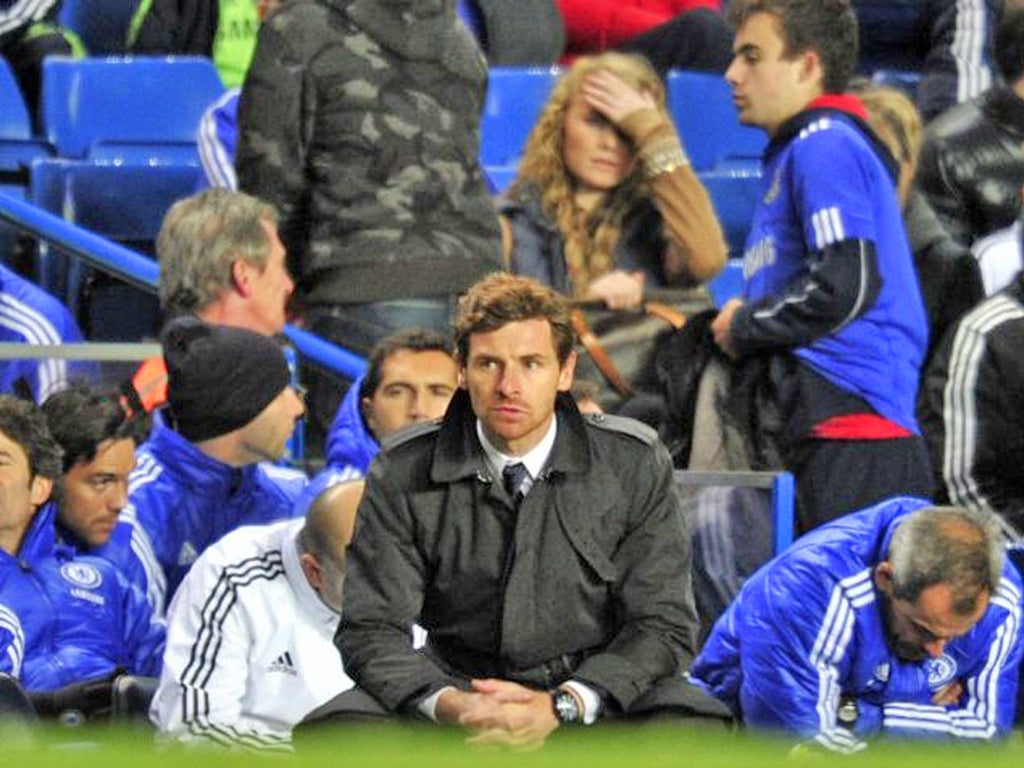Rory Smith: Whispers of disapproval spell danger for rookie manager
Portuguese's sudden decision to gamble on new formation and his perseverance with aging squad raises questions

Sir Alex Ferguson has long since determined to belittle them, dismissing them as know-nothing self-promoters. Rafael Benitez, his erstwhile nemesis, eventually learnt to mute them. Andre Villas-Boas, it seems, has yet to develop a coping mechanism for the footballer-turned-television-pundit. They evidently still get under his skin.
Gary Neville's suggestion that David Luiz was a central defender as imagined by a child playing PlayStation in the stands was met with a withering rebuke. "It is a stupid approach to an opinion," hissed the Chelsea manager. Michael Ballack and Alan Hansen, too, earned his scorn after suggesting his side lacked mental resolve and the wisdom of experience, respectively.
There is something about a former player which seems to grate on the Portuguese. A cod psychologist, no doubt, would suggest the 34-year-old's distaste for the views of those who have played the game indicates an insecurity over the one glaring flaw on his own CV, a subconscious acknowledgement that part of Villas-Boas fears he is being taken for a charlatan. Conquering that enmity, though, is nothing compared to the more immediate challenge he faces: handling, for the first time, the criticism of his own players, the ones currently tasked with protecting his reign.
Until Tuesday night's callow Carling Cup surrender to Liverpool, Chelsea's fifth defeat in nine games, their third home loss in four fixtures, the Portuguese had retained the faith of the majority of his squad. Now, though, a dressing room as politicised, as influential, as powerful, as any in the country is beginning to ask questions.
Why would Villas-Boas instruct his team to adopt a formation – what would, 10 years ago, have been called a 4-4-2 diamond but is now annotated as a 4-1-2-1-2 – which they had not practised in training, not even once? The manager was brave enough to admit, albeit tacitly, in the aftermath of defeat that the experiment had not worked, that Chelsea will return to 4-3-3 at Newcastle on Saturday. But why indulge it in the first place, in a tie which the club could ill afford to lose and at a time when momentum appears to be of paramount importance?
Moreover, why simultaneously request that his strikers draw wide to test Liverpool's full-backs when the system he had imposed on the team was not one which possessed the width to make the most of such a plan?
The most obvious answer, of course, is that Villas-Boas, for all his talk of philosophical purity and ideological rigidity, has accepted that his preferred style is ill-suited to the players at his disposal and that he is, at the last, desperately casting around for an alternative. Managers, broadly speaking, begin to tinker with tactics previously presented as non-negotiable when all else is lost.
That may be a little extreme in Villas-Boas's case; though among Chelsea's playing staff there is a suspicion the Portuguese could go at any minute, it is believed Roman Abramovich has no immediate plans for such drastic action. Defeats against Newcastle, Valencia or Manchester City may change that, of course, but such is the peril of entrusting one's employment to the whim of a capricious oligarch.
As above, so below: as Villas-Boas's relationship with his players exhibits the first signs of deterioration, of mistrust, so his dealings with those above him grow more tense.
It is believed he and Michael Emenalo, the former Nigerian international now employed as the club's technical director and one of Abramovich's closest advisers, disagreed in the summer over the Portuguese's desire to allow an ageing squad one last chance to prove themselves; his poor start to his first season, meanwhile, has prompted concern in some quarters that he will lack the authority – even if he survives until the end of the campaign – to begin the arduous task of clearing out those players who have been found wanting.
That was the attraction to Abramovich of a young, inspirational manager: that he might rebuild the club in his own image, that he might possess enough power and enough ambition to smash the cliques which divide the dressing room. Those with an intimate knowledge of the situation speak of three distinct groups at Cobham: an English faction, clustered around John Terry and Frank Lampard; another centred on Didier Drogba; and a third, largely comprised of the club's Iberian players.
No wonder Liverpool's defender Martin Kelly, scorer of Kenny Dalglish's side's second goal on Tuesday night, was moved to remark that "one side out there [was] playing as a team and the other was playing like individuals."
Villas-Boas was brought in to put an end to the chronic schisms which have undermined Chelsea for so long; the worry at the club is that now, with his position weakened so soon, he is no more a strongman than any of his predecessors. He does not command the absolute respect of his players, or the absolute faith of his superiors. He can always switch off the voices emanating from his television or his radio. The real danger, though, lies not in the words, but the whispers.
Subscribe to Independent Premium to bookmark this article
Want to bookmark your favourite articles and stories to read or reference later? Start your Independent Premium subscription today.

Join our commenting forum
Join thought-provoking conversations, follow other Independent readers and see their replies